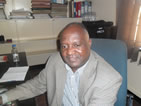By Houmi Ahamed Mikidache
 Recently at UNESCO in Paris, more than 2000 scientists met to discuss opportunities to fight against climate change. They also found solutions on how to reduce emission from all fossil fuel sources. During the conference, Parkie Mbozie, research fellow at the Institute of Economic and Social Research of the University of Zambia gave his view on the adaptation financing based on a study his institute conducted. Financing adaptation is challenging in Zambia. On his study, Parkie Bozie looked at how difficult it is for communities at grassroots level to access adaptation finance in his country. “What we see from our study is that the community at the grassroots level is not involved in determining the type of projects that make sense to them. So Adaptation should really be looking at alternative livelihoods.[…] As you know, adaptation is much more important to Africa than mitigation, in the sense that Africa contributes in a very small percentage , less than 2% emission [of Greenhouse Gas Emission in the world]. When you talk about mitigation, it does not make sense as adaptation. Adaptation responds to the problem they [people] are facing.” In his study, Mr Bozie emphasizes the lack of transparency, communication and understanding of the adaptation process in Zambia. But also, he raised a concern on the huge amount allocated to mitigation for the Reduced Emissions from deforestation and forest degradation (REDD+) that, for him, no expert in his country understands. Zambia is yet to submit its Intended Nationally Determined Contributions (INDCs).
Recently at UNESCO in Paris, more than 2000 scientists met to discuss opportunities to fight against climate change. They also found solutions on how to reduce emission from all fossil fuel sources. During the conference, Parkie Mbozie, research fellow at the Institute of Economic and Social Research of the University of Zambia gave his view on the adaptation financing based on a study his institute conducted. Financing adaptation is challenging in Zambia. On his study, Parkie Bozie looked at how difficult it is for communities at grassroots level to access adaptation finance in his country. “What we see from our study is that the community at the grassroots level is not involved in determining the type of projects that make sense to them. So Adaptation should really be looking at alternative livelihoods.[…] As you know, adaptation is much more important to Africa than mitigation, in the sense that Africa contributes in a very small percentage , less than 2% emission [of Greenhouse Gas Emission in the world]. When you talk about mitigation, it does not make sense as adaptation. Adaptation responds to the problem they [people] are facing.” In his study, Mr Bozie emphasizes the lack of transparency, communication and understanding of the adaptation process in Zambia. But also, he raised a concern on the huge amount allocated to mitigation for the Reduced Emissions from deforestation and forest degradation (REDD+) that, for him, no expert in his country understands. Zambia is yet to submit its Intended Nationally Determined Contributions (INDCs).
Source: Zambia reels under poor understanding of climate finance mechanisms – Study | Climate Reporters




